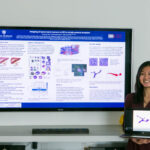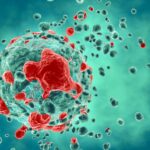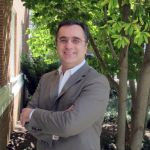Cancer Nanotechnology theme of INBT’s symposium, May 12-13
Nanoscale tools developed by engineers have yet to be fully explored and exploited for the diagnosis and treatment of diseases such as cancer. Nanotechnology for Cancer Medicine forms the focus of the fifth annual symposium for Johns Hopkins Institute for NanoBioTechnology (INBT), May 12 and 13, 2011 at the university’s Homewood campus.
Friday, May 13 will feature a symposium with talks from a slate of faculty experts in nanotechnology, oncology, engineering and medicine. Registration begins at 8:30 a.m. in Shriver Hall Auditorium. A poster session begins at 1:30 p.m. upstairs in the Clipper Room showcasing research from INBT affiliated faculty laboratories across several Johns Hopkins University divisions. Past symposiums have attracted as many as 500 attendees and more than 100 research posters.
Keep checking INBT’s 2011 symposium page for updated information on speakers and more details on how to register and submit a poster title. The symposium and poster session are free for Johns Hopkins affiliated faculty, staff and students.
Keynote Speaker
Stephen B. Baylin is currently Deputy Director, Professor of Oncology and Medicine, Chief of the Cancer Biology Division and Director for Research, of The Sidney Kimmel Comprehensive Cancer Center at Johns Hopkins.For the last 20 years, Stephen Baylin has studied the role of epigenetic gene silencing in the initiation and progression of human cancer. He and his colleagues have fostered the concept that DNA hypermethylation of gene promoters, and associated transcriptional silencing, can serve as an alternative to mutations for producing loss of tumor suppressor gene function. They have described some of the classic genes involved, invented approaches to randomly screen the cancer genome for such genes and to demonstrate their functional role in cancer progression, helped begin unravel the molecular mechanisms responsible for the initiation and maintenance of the gene silencing, and worked to utilize all of their findings for translational purposes. Baylin has authored or co-authored over 375 full-length publications on the above and other areas of cancer biology.
He has been a member of committees of the American Cancer Society and of National Institutes of Health, and his honors include a Research Career Development Award from NIH, the Edwin Astwood Lectureship of the Endocrine Society, the 2003 Jack Shultz Memorial Lecture in Genetics, Fox Chase Cancer Center, The 2004 National Investigator of the Year Award from the National Cancer Institute SPORE program, the Jack Gibson Visiting Professorship, University of Hong Kong Queen Mary Hospital, Hong Kong, The 2004 2nd Annual Sydney E. Salmon Lectureship in Translational Research, Arizona Cancer Center, the 2005 Shubitz Cancer Research Prize from the University of Chicago, and he currently holds the Virginia and D.K. Ludwig Chair in Cancer Research at Johns Hopkins. Baylin is also recipient of the 2007 Woodward Visiting Professor, Memorial Sloan-Kettering Cancer Center, the 2008 Raffaele Tecce Memorial Lecture, Trento, Italy, the 2008 The David Workman Memorial Award (jointly with Peter A. Jones, Ph.D.) from the Samuel Waxman Foundation, and the 2009 Kirk A. Landon-AACR Prize for Basic Cancer Research, also shared with Peter A. Jones, the 14th NCI Alfred G. Knudson Award in Cancer Genetics, and, most recently, the Nakahara Memorial Lecture prize at the 2010 Princess Takematsu Symposium. Currently, he leads, with Peter Jones, the Epigenetic Therapy Stand up to Cancer Team.
Additional confirmed speakers for the 2011 INBT Symposium include:
- Martin Pomper is a professor at Johns Hopkins School of Medicine with a primary appointment in Radiology and secondary appointments in Oncology, Radiation Oncology, and Pharmacology and Molecular Sciences, as well as Environmental Health Sciences at the Johns Hopkins Bloomberg School of Public Health. Pomper co-directs Johns Hopkins Center of Cancer Nanotechnology Excellence (CCNE).
- Anirban Maitra is a professor at Johns Hopkins School of Medicine with appointments in Pathology and Oncology at Sol Goldman Pancreatic Research Center and secondary appointments in Chemical and Biomolecular Engineering at the Whiting School of Engineering and the McKusick-Nathans Institute of Genetic Medicine. Maitra co-directs Johns Hopkins Cancer Nanotechnology Training Center and is a project director in the CCNE.
- Jin Zhang is an associate professor at Solomon H. Snyder Department of Neuroscience at Johns Hopkins School of Medicine with primary appointments in Pharmacology and Molecular Sciences and secondary appointments in Neuroscience, Oncology, and Chemical and Biomolecular Engineering.
- Hy Levitsky is a professor of Oncology, Medicine and Urology at the Johns Hopkins School of Medicine and the Scientific Director of the George Santos Bone Marrow Transplant Program. Levitsky is a project director at the Center of Cancer Nanotechnology Excellence (CCNE).
- Gregory Longmore is a professor at the Washington University in St. Louis School of Medicine, Department of Medicine, Oncology Division, Molecular Oncology Section and the Department of Cell Biology and Physiology. Longmore is a project co-director at Johns Hopkins Physical Sciences-Oncology Center (PS-OC).
- Denis Wirtz is the Theophilus H. Smoot Professor of Chemical and Biomolecular Engineering in the Whiting School of Engineering at Johns Hopkins University. Wirtz is associate director of INBT and director of the Johns Hopkins Physical Sciences-Oncology Center, also known as the Engineering in Oncology Center. He has a secondary appointment in Oncology at the Johns Hopkins School of Medicine.
Workshops
During the afternoon of May 12, INBT will hold four 2-hour hands-on laboratory workshops organized by faculty affiliated with INBT, PS-OC or CCNE. Workshop registration will be limited to 10 persons per session. Sessions will begin at 1 and 3:30 p.m. and will be held in the New Engineering Building. Workshop details, including any costs, are forthcoming.
Become a sponsor
If you or your organization would like to learn how to sponsor INBT’s annual symposium, please contact our director of corporate partnerships, Tom Fekete, at tmfeke@jhu.edu or call him at 410-516-8891. Sponsors enjoy reduced rates on symposium-related events and advertising in our annual Nano-Bio magazine/symposium program, among other benefits.
Media inquiries may be directed to Mary Spiro, science writer and media relations director for INBT, at mspiro@jhu.edu or 410-516-4802.
Latest Posts
-
 Q&A with PSON Intern Jocelyn Hsu
August 19, 2021
Q&A with PSON Intern Jocelyn Hsu
August 19, 2021
-
 Start Up Founders from Johns Hopkins Aim to Stop Spread of Cancer
August 3, 2021
Start Up Founders from Johns Hopkins Aim to Stop Spread of Cancer
August 3, 2021
-
 Protein Appears to Prevent Tumor Cells from Spreading Via Blood Vessels
July 15, 2021
Protein Appears to Prevent Tumor Cells from Spreading Via Blood Vessels
July 15, 2021


